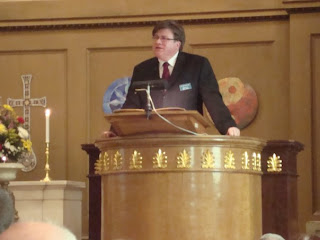 It is hard to put into words the internal conflicts I feel these days. I am looking forward to the fall when I will become Minister of First Unitarian Church of Baltimore (Universalist & Unitarian). This is a larger challenge, I think, than any I have faced. But it is a place where excellent professional ministry has been performed for over a decade, and there is a strong sense of what it means that the congregation made a decision, some thirty five years ago, to continue to be a vital presence in downtown Baltimore. This sense of collective vocation, dearly recited to me by dozens of people in the past six months, excites me, as it matches my own sense of vocation to the city with all its challenges. I love being in a place that seeks to build community in ways that transcend class and gender, ethnicity and sexuality, that incorporate faith in the past and hope for the future. I am clearly looking forward to the opportunities and challenges of the Charm City.
It is hard to put into words the internal conflicts I feel these days. I am looking forward to the fall when I will become Minister of First Unitarian Church of Baltimore (Universalist & Unitarian). This is a larger challenge, I think, than any I have faced. But it is a place where excellent professional ministry has been performed for over a decade, and there is a strong sense of what it means that the congregation made a decision, some thirty five years ago, to continue to be a vital presence in downtown Baltimore. This sense of collective vocation, dearly recited to me by dozens of people in the past six months, excites me, as it matches my own sense of vocation to the city with all its challenges. I love being in a place that seeks to build community in ways that transcend class and gender, ethnicity and sexuality, that incorporate faith in the past and hope for the future. I am clearly looking forward to the opportunities and challenges of the Charm City.But Vehicle City is my home, now, and my vocation as Minister of the Unitarian Universalist Church of Flint is one that I do not resign easily. Flint is a strong community that has been struggling with its essential identity for over a generation. The birthplace of General Motors, of course it is; but my friend Jack reminds me that it is more fully the birthplace of the American automobile industry. Ford was head of Cadillac before he built his own company, and Chrysler was the head of Buick at the time of the General Motors consolidation. Flint was transformed from being Carriage Town to Vehicle City, and stayed so until the Reagan years.
Now General Motors has nearly abandoned Flint, save all that money left in the coffers of the Mott family foundations. And Flint is seeking its new identity.
My great dream is that Flint will emerge from a culture of dependency (on GM, on the autoworker unions, on the Mott family) and begin to chart its own destiny in ways that are power-distributed and more egalitarian, more grassroots and, frankly, more fun. And I think my Unitarian Universalist Church of Flint is one of the centers that may model a new way of being for a new Flint.
But, alas, I will no longer be at the helm. In the next two and a half months, I need to be as fully present as I can to the congregation, while taking no role in setting a future direction for the church. They get to set the budget that they feel best reflects their capacity and their dreams for the next year. (They did that last week.) They need to decide about professional ministry for the interim year before they call a new settled minister (if they decide they will). And they are working on that. And I am available to assist, to give resource, but not to lead.
I have a lot of "me" invested in the success of planting Flint Area Congregations Together in the congregation, and believing that there are congregational leaders there who will keep our church in the leadership of FACT, a position we clearly take now. And as I add my own thoughts to the planing of a forum in July with mayoral candidates in Flint, I find that I give my advice and then let go of it. Some one else needs to carry the torch.
I hope I can learn everything I need to learn in these next weeks about ways I can lead without controlling. I think these lessons will be useful in Baltimore (and in so many areas of my life). I want to stay open, let go of that which I cannot control, and take charge of my own work and my own feelings as I take leave of a group of passionate and dear people in this place. And as I look forward to the Charm City, I hope I will continue to hold Vehicle City in my heart.
Good morning.
2 comments:
"I love being in a place that seeks to build community in ways that transcend class and gender, ethnicity and sexuality, that incorporate faith in the past and hope for the future. I am clearly looking forward to the opportunities and challenges..."
Gee David, I thought that is what we were doing here ... in Flint ...
Sounds like the Flint congregation and the Baltimore congregation have a lot in common. I know that both cities offer similar challenges in terms of poverty and such. I will miss you, but I believe that change is the only constant and that is where growth happens. Growth for us all.
Post a Comment